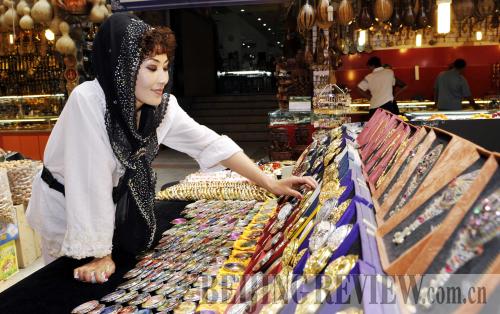|
 |
|
A retailer arranges her goods at the International Grand Bazaar in Urumqi, capital of northwest China's Xinjiang Uygur Autonomous Region, on July 22 (XINHUA) |
The International Grand Bazaar in Urumqi, capital of Xinjiang Uygur Autonomous Region, reopened Wednesday for the first time since the deadly riot in the city on July 5.
Almost half of the 4,000 shops and booths in the bazaar in Urumqi opened at around 11 a.m., and closed for the day at 6 p.m., two and a half hours earlier than usual, said Wuxkur Yunus, deputy manager of the bazaar.
"U.S. fast food chain stores Kentucky Fried Chicken and Carrefour stores in the bazaar are scheduled to reopen tomorrow when 80 percent of the businesses will be open to customers," said Wuxkur.
The bazaar received only about 200 customers Wednesday, compared with more than 100,000 everyday before the riot, Wuxkur said.
Shop owners told Xinhua that they depend mainly on tourists for business. However, the tourism industry was badly affected during the riot and the number of tourists dropped significantly.
Gulibahar, who sells shawls in the bazaar, said "we hope the situation will get better, so that we will have customers."
She used to sell 5,000-10,000 yuan ($732-1,464) worth of shawls per day before the riot, but failed to sell any Wednesday.
Security was tightened as the bazaar administration doubled the number of security guards to 70. Knives were banned from sale.
Police armed with batons and shields patrolled the bazaar. A large streamer with the words "Against Separation of Nationalities, Safeguard National Unity" was seen on an 80-meter sightseeing tower.
A tourist named Ren Wentao said he noticed the small number of customers in the bazaar.
"There is nothing to be afraid of with the presence of police. I hope the bazaar could open for more hours."
Wuxkur estimated that each of the shops suffered an average daily loss of 2,000 yuan during the 16-day closure.
The banquet grand theatre in the bazaar, a major attraction where visitors can enjoy ethnic cuisine along with ethnic singing and dancing, also suffered from the closure.
"We lost 200,000 yuan each day," said Wuxkur, who is also manager of the banquet grand theatre.
The bazaar was closed on July 6 after the riot in Urumqi that left 197 people dead and more than 1,600 others injured. Many shops were looted and vandalized.
The bazaar is a 100,000-square-meter commercial complex with a strong Islamic architectural influence that includes a banquet hall, a food court, a sightseeing tower, an open-air stage and a mosque.
(Xinhua News Agency July 22, 2009) | 